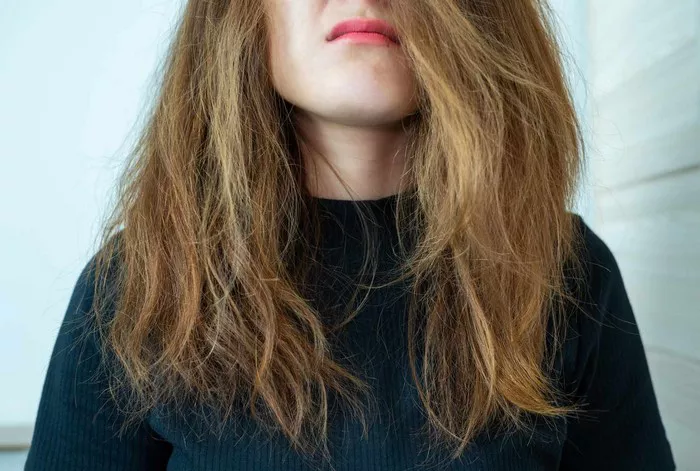If your hair breaks easily, feels dry, or lacks strength, you might wonder: Why is my hair so fragile? As a hairstylist, I’ve seen countless clients struggle with weak, brittle hair. The truth is, fragile hair rarely has a single cause. Instead, it’s often the result of a mix of habits, genetics, and external factors. Let’s break down the possible reasons your hair is delicate—and how you can address them.
To help you pinpoint the issue, I’ll ask you questions about your lifestyle, hair care routine, and health. By the end of this guide, you’ll have a clearer idea of what’s weakening your hair and how to fix it.
Genetics: Is Weak Hair Part of Your DNA?
Your hair’s strength starts with your genes. Some people are born with fine, thin hair that’s naturally prone to damage. For example, if your parents have fragile hair, you might too.
- Question: Does your family have a history of thin, brittle, or slow-growing hair?
- Question: Is your hair naturally fine (like a single strand feels barely visible)?
Genetics also determine your hair’s texture. Curly or coily hair types are often drier because natural oils from the scalp struggle to travel down the twists. This dryness can lead to breakage if not managed properly.
Chemical Damage: Are You Over-Processing Your Hair?
Chemical treatments like coloring, bleaching, perms, or relaxers weaken hair by breaking down its protein structure. Each time you chemically alter your hair, the outer layer (cuticle) gets damaged, making it easier to snap.
- Question: How often do you dye, bleach, or straighten your hair?
- Question: Does your hair feel gummy or stretchy when wet (a sign of severe protein loss)?
For example, bleaching opens the hair cuticle to remove pigment, stripping away moisture and lipids. Over time, this leaves hair porous, dry, and prone to splitting.
Heat Styling: Are Hot Tools Burning Your Hair?
Flat irons, curling wands, and blow dryers can reach temperatures over 400°F (204°C). Excessive heat melts the hair’s keratin proteins, causing bubbles to form inside the strand. This weakens the hair’s structure, leading to breakage.
- Question: Do you use heat tools daily or without a heat protectant?
- Question: Do you notice white, crispy ends or hear a sizzling sound when styling?
Even “heatless” styles like tight ponytails or braids can cause friction and pull hair from the roots, creating fragility over time.
Environmental Stressors: Is Your Hair Exposed to Sun or Pollution?
Sunlight, wind, and pollution don’t just affect your skin—they damage hair too. UV rays break down the proteins in your hair, while pollution particles cling to strands, causing dryness and inflammation on the scalp.
- Question: Do you spend hours outdoors without covering your hair?
- Question: Does your hair feel gritty or look dull after a day outside?
Chlorine from pools and hard water (high in minerals like calcium) can also coat hair, blocking moisture and making it brittle.
Hair Care Habits: Are You Washing or Brushing Wrong?
Your daily routine might be harming your hair without you realizing it.
Over-Washing:
Shampooing too often strips natural oils, leaving hair dry. This is especially true if you use harsh sulfates (e.g., sodium lauryl sulfate).
- Question: Do you wash your hair daily or with clarifying shampoos often?
Rough Brushing:
Tugging through tangles with a fine-tooth comb or brushing wet hair (which is 50% weaker) can cause splits and breakage.
- Question: Do you hear snapping sounds when detangling?
Wrong Products:
Heavy silicones or alcohols in products can either suffocate hair or dry it out.
- Question: Do your hair products leave buildup or make your scalp itchy?
Diet and Health: Is Your Body Nourishing Your Hair?
Hair is made of protein (keratin), so a poor diet or health issue can starve your strands.
Nutrient Deficiencies:
Low iron, zinc, biotin, or vitamin D levels weaken hair. Crash diets or vegan diets without proper planning often lack these nutrients.
- Question: Have you had blood work done recently? Are you often fatigued?
Medical Conditions:
Thyroid disorders, anemia, or hormonal imbalances (e.g., PCOS) disrupt hair growth cycles. Medications like antidepressants or acne drugs may also thin hair.
- Question: Have you noticed hair loss alongside fatigue, weight changes, or skin issues?
Stress:
Chronic stress raises cortisol levels, pushing hair into the “shedding” phase (telogen effluvium).
- Question: Have you been under extreme stress in the past 6 months?
Aging: Is Time Thinning Your Hair?
As we age, hair follicles shrink, producing thinner, weaker strands. Estrogen and testosterone drops (especially during menopause or andropause) also affect hair density.
- Question: Are you over 40 and noticing slower growth or finer textures?
How to Repair Fragile Hair: A Custom Plan
Once you’ve identified your triggers, here’s how to fight back:
- Trim Regularly: Cut split ends every 6–8 weeks to prevent splits from traveling upward.
- Deep Condition: Use protein-rich masks (e.g., hydrolyzed keratin) 1–2x weekly to rebuild strength.
- Protect from Heat: Limit hot tools to 2x weekly, and always apply a heat protectant spray.
- Switch Products: Try sulfate-free shampoos and leave-in conditioners for your hair type.
- Cover Up: Wear hats or UV-protectant sprays outdoors.
- Eat for Hair Health: Add eggs, spinach, nuts, and salmon to your diet for biotin and omega-3s.
- Consult a Pro: See a dermatologist if you suspect health issues or a stylist for personalized care.
Conclusion
Fragile hair is frustrating, but it’s rarely hopeless. By answering the questions in each section, you’ve likely spotted patterns—maybe you’re over-bleaching, skipping heat protection, or lacking iron. Start with small changes, like swapping your shampoo or adding a weekly mask, and track improvements.
Remember, healthy hair grows from a mix of gentle care, good nutrition, and patience. If you’re stuck, visit a stylist or trichologist for tailored advice. Your hair can bounce back!
Related topics:
When Are Hair Transplant Grafts Secure? A Complete Guide
How Can I Stop My Hair Falling Out After Surgery?


